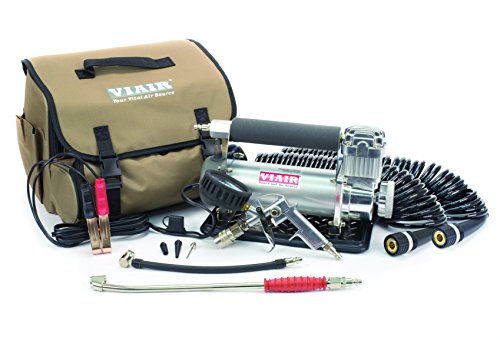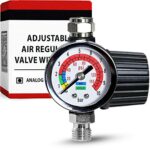
For portable air compressors, the CFM ratings are provided in terms of PSI. For example, an air compressor rated 3CFM at 90 PSI should potentially deliver that 3 CSM at 90 PSI. However, like CFM, manufacturers sometimes advertise the overinflated rate. Now that you know what to look for to find the best portable air compressors for your RV, check out my top five picks! VIAIR 400P-RV Portable Air Compressor for RV This VIAIR is considered by many to be the best tire inflator for RV on the market.
We researched the best portable air compressors for you. The CAT 3-in-1 Portable Air Compressor and Power Station is the perfect choice for RV living. These portable air compressors can inflate most bicycle, automotive and recreational tires, as well as air mattresses, rafts, sports equipment, and more.
best air compressor for rv use Related Question:
What kind of air compressor do I need to winterize my RV?
Hands down, the best air compressor for winterizing your RV is the Viair 450P. This portable air compressor has a 100% duty cycle. This allows you to run it continuously without having to rest it.
What size air compressor do you need to winterize a camper?
Volume – not pressure – is what you need. A 20 gallon air compressor is probably more than you’ll need to simply winterize an RV. If you’ve got one that large, it will work fine, but others use much smaller compressors.
Do I need air compressor for RV?
Benefits of Carrying a Portable Air Compressor for RV Travel When your RV travels with too much or not enough tire pressure, they’re more vulnerable to blowouts. You should always make sure you have filled your RV and truck tires to the proper level. Having an air compressor on hand can make that possible.
How much air do you put in motorhome tires?
The tire pressure on an average 16″ RV tire can be anything between 35-80 PSI or 280-550 kPa. That’s a wide range – and you need to find the right number for your specific weight and number of wheels.
What PSI Do I need to winterize my camper?
You can use an air compressor to help blow out the water in the lines. If using an air compressor, set it to 30 psi, with a maximum air pressure of 50 psi. Also, walk around your trailer and open up the water valves one at a time when using an air compressor.
Is blowing out RV water lines vs antifreeze?
When you blow out your RV water lines with compressed air, there’s no lingering taste or odor of antifreeze after de-winterizing. When blowing out RV water lines vs using antifreeze, because there’s no antifreeze in the fresh water lines, there’s no risk of a lingering taste or odor in your water after de-winterizing.
What does an air compressor do in an RV?
Convenience. Air compressors for RV tires make your traveling easy and convenient. They are easy to use for inflating your vehicle tires quickly. You can attach the compressor to the cigarette lighter or on your car battery, and it will automatically start inflating the tires.
Where are ARB compressors made?
Where are ARB air compressors made? ARB compressors are 100% assembled and dyno tested here in Australia. Each compressor is dyno tested for flow, amps, and RPM among other measures, providing a complete quality check on every unit.
What PSI should I fill my RV tires to?
All tires will have their maximum pressure stamped on the sidewall. This is what mine look like, and on these tires (Firestone Transforce) it’s 80 psi. Now, inflating the tires to 80 psi will certainly provide all the load carrying capacity that the tires are capable of.
What PSI should camper tires be?
For travel trailers, it is recommended to have a maximum of 85 PSI. Usually, caravans and trailers (new or used) have an owner’s manual that specifies the ideal tire pressure level. Even used trailers have a plate indicating the correct inflation level.
Will RV holding tanks freeze?
Having your holding tanks freeze can cause substantial damage that isn’t just a hassle to fix, it’s expensive too! The potential to freeze is largely dependent on your holding tank’s location within your rig. If they are above floor level, the ambient heat of your interior furnace will help to delay freezing.
Can I put RV antifreeze in my freshwater tank?
The RV Doctor’s Orders It can be easier to pump it backwards through a faucet spout using a backflow kit with a hand pump, but it is totally acceptable to pour the antifreeze directly into the fresh tank and use the RV’s water pump to pump it throughout the system as well.
Can you winterize RV without antifreeze?
No matter what your reason might be for winterizing your RV sans antifreeze, the process is the same. The goal with this winterization method is to remove as much water as possible from the lines and tanks. This is done using an air compressor to blow the lines out after emptying all tanks.
How cold does it have to be for RV lines to freeze?
As a general rule, the water in an RV’s pipes could freeze when the temperature dips below 32 degrees Fahrenheit for a day. But in many cases, it would need to get well below 30 for an extended period of time for most RV pipes to freeze.
Can I use car antifreeze in my RV?
Ethylene Glycol Antifreeze Ethylene glycol is a very toxic component that is not safe for RVs. Typically, this chemical is seen in automotive antifreeze, and it should only be used in automobiles, not the holding tanks of recreational vehicles.

